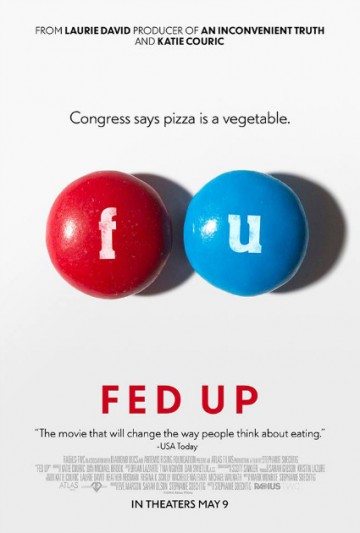 Stephanie Soechtig's Fed Up is a bit like eating your
veggies; it's not exciting or particularly packed with flavor, but it
is beneficial for you to consume. While the information within the
film itself is undoubtedly important, I'm not really here to grade it
on its pertinence so much as how well it delivers its message in an
informative and entertaining way. While, as a film, it certainly
could use much more pizzazz and vision, ultimately it does get
across its message that our nation's health, and specifically
our childrens' problem with obesity, should be one of our utmost
concerns. Since the powerful food lobbies have infiltrated
congress and laid claim to the "nutrition" in most of our nation's schools, it's up to us to vocalize and mobilize
to fight them in greater numbers to stem the tide of non-foods that
our children are marketed directly to that contain little nutritional
value, and a whole heaping helping of things that are unhealthy,
including, most notably, lots of added sugar.
Stephanie Soechtig's Fed Up is a bit like eating your
veggies; it's not exciting or particularly packed with flavor, but it
is beneficial for you to consume. While the information within the
film itself is undoubtedly important, I'm not really here to grade it
on its pertinence so much as how well it delivers its message in an
informative and entertaining way. While, as a film, it certainly
could use much more pizzazz and vision, ultimately it does get
across its message that our nation's health, and specifically
our childrens' problem with obesity, should be one of our utmost
concerns. Since the powerful food lobbies have infiltrated
congress and laid claim to the "nutrition" in most of our nation's schools, it's up to us to vocalize and mobilize
to fight them in greater numbers to stem the tide of non-foods that
our children are marketed directly to that contain little nutritional
value, and a whole heaping helping of things that are unhealthy,
including, most notably, lots of added sugar.
Soechtig (Tapped), with assistance from narrator and executive producer Katie Couric
("Katie", "Good Morning America"),
takes a very long time for her film to get to the point, and though it
ends up being worth the wait for viewers unaware of the problem, it
makes for a frustrating watch to see points get dragged out. The
bottom line of the film is this: diet & exercise aren't the only
things that matter when it comes to maintaining a healthy weight --
the content of the food we eat is what's most vital. A calorie
isn't just a calorie, according to Dr. Robert Lustig, UCSF professor
of clinical pediatrics. 160 calories in almonds is handled by
the body in a far more efficient manner due to its fiber content
(which delays absorption) than 160 calories in a soda, which is purely
"sugar calories" that the body nearly instantly stores as fat.
And sugar is addictive -- more so than cocaine, according to one
popular study; we immediately want more foods containing it, even if
we aren't necessarily hungry.
About half of the somewhat stretched-out film (this film could have
easily been an hour-long expose for TV with commercials and not lost
any content) deals with the true-life testimonials of obese children
who have tried and failed miserably to lose weight despite efforts to
eat better and exercise regularly. Soechtig never comments
directly, but one can easily see, when juxtaposed with the educational
information delivered by the nutritionists, that the so-called diet
foods that these kids, and many of us in the audience, regularly
consume are actually making the problem worse. Low-fat and
non-fat foods substitute the missing fat with lots of sugar in order to
deliver taste, which, of course, is stored as fat when it is absorbed
in the body. Meanwhile, the kids are bombarded by fast food
choices at school, as pizza, cookies, cakes, burgers, fries, puddings,
juices and soda are among the food options, without a single added
veggie on their plate. It's literally a recipe for weight gain
and poor health.
The testimonials add emotional content to the film, but in the end, their point is not driven home
with enough force to make much of a dent. One of the kids has
success losing weight by sticking to "real food" cooked at home in his
diet, but in an epilogue, we're told he gains it all back without telling
us why. Did he go back to his old eating habits? One
assumes, but it would be nice to know for the purpose of the overall
point of the entire film.
Another very obese child undergoes bariatric surgery and does lose a
significant amount of weight, but little of his story has to do
with nutritional information we can use, other than to point out the
hypocrisy that
we, as taxpayers, are willing to expend tens of thousands of dollars in order to have
a kid undergo surgery to stay alive rather than spend money on school
lunch programs that promote healthier food choices.
The final moments of this otherwise middle-of-the-road documentary
fosters an
activist approach to nutrition in which we should not only educate
ourselves by visiting the film's website, but also contact our
political representatives to put pressure on them the other way, away
from the billion dollar food industry lobby which regularly funnels money into
the political system, and into advertising their unhealthy wares to us
at an early age. While the message is delivered, it never quite
grabs a hold the way it could, and seems soft in its indictment of
the food industry compared to, say, the in-your-face approaches of
other documentarians like Michael Moore and Morgan Spurlock.
I'm not suggesting Fed Up should have taken a bombastic
approach, but it should really go for the knockout when it has the
chance, rather than pull punches when dealing with out-of-control food
corporations who are as cutthroat as you can get on their side.
They will continue to feed poison to your kids for every dollar than
ever let you put a restriction on where and when their foods can be
sold or advertised, so they have absolutely no qualms; they will lie
to your fice if it means they lose their bottom line profits. The
poster for Fed Up has the tagline, "Congress says pizza is a
vegetable", just above a picture of (presumably) M&M's with the
letters that read "F U" on it; this should have been the incendiary
"mad as hell" tone of the film in the end, if not completely from the
get-go.
You start a revolution by putting fire in the bellies of those who are
tired of stuffing them with sugary foods; it's far better to go to
battle with people who are there to fight tooth and nail with you than
with someone who thinks the battle for ideas are best handled with a
mild, common sense approach. Fed Up is important
information that would have been better served building on the tone of
its title to implore us to really hit the food and beverage
corporations where they hurt. While the information presented is good
for making decisions for ourselves and our families around the dinner
table, Fed Up should have been less
familiar and friendly and more feisty and "fired up" for us
to take up arms for its uphill
fight.
Qwipster's rating:







©2014 Vince Leo

 Stephanie Soechtig's Fed Up is a bit like eating your
veggies; it's not exciting or particularly packed with flavor, but it
is beneficial for you to consume. While the information within the
film itself is undoubtedly important, I'm not really here to grade it
on its pertinence so much as how well it delivers its message in an
informative and entertaining way. While, as a film, it certainly
could use much more pizzazz and vision, ultimately it does get
across its message that our nation's health, and specifically
our childrens' problem with obesity, should be one of our utmost
concerns. Since the powerful food lobbies have infiltrated
congress and laid claim to the "nutrition" in most of our nation's schools, it's up to us to vocalize and mobilize
to fight them in greater numbers to stem the tide of non-foods that
our children are marketed directly to that contain little nutritional
value, and a whole heaping helping of things that are unhealthy,
including, most notably, lots of added sugar.
Stephanie Soechtig's Fed Up is a bit like eating your
veggies; it's not exciting or particularly packed with flavor, but it
is beneficial for you to consume. While the information within the
film itself is undoubtedly important, I'm not really here to grade it
on its pertinence so much as how well it delivers its message in an
informative and entertaining way. While, as a film, it certainly
could use much more pizzazz and vision, ultimately it does get
across its message that our nation's health, and specifically
our childrens' problem with obesity, should be one of our utmost
concerns. Since the powerful food lobbies have infiltrated
congress and laid claim to the "nutrition" in most of our nation's schools, it's up to us to vocalize and mobilize
to fight them in greater numbers to stem the tide of non-foods that
our children are marketed directly to that contain little nutritional
value, and a whole heaping helping of things that are unhealthy,
including, most notably, lots of added sugar.